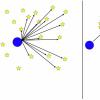Mikey needs to come back and talk to us about his quercetin/dasatnib protocol and experience. That one looks very interesting. I've done a 6 month regimen of 1000mg quercetin on the weekends, but I haven't got the guts to add dasatnib to it.
Mikey's protocol indeed came to fruition. But if you look at his whole regimen for so many years - and staying consistent as with my case - you would also have to admit that he took too many thinks for being able to pin it down to 1 agent only.
Posted 19 September 2013 - 05:17 PM
I started taking C60oo in early August, 2012, ..
.. high-dose vitamin K2 (MK4) .. So, I began taking 5 mg three times a day. I'm raising it to 15 mg, tid, because it is not toxic and I've seen multiple recommendations for 45 mg/day.
I'm also taking vitamin K2 (MK7) 400 mcg/day.
K1 has beneficial effects for bone, but not plaque, but I am taking 200 mcg/day of it, also.
I get xanthohumol from ..
Calcium is in the multi I take but I don't even take half the RDA.
I've been taking 5-6 capsules of Tocomin SuprBio tocotrienols a day for several years, ..
Taking 8,500 IU/day, my OH-vitamin D tests as 60 ng/ml, ..
I've been taking nattopeptase and serrapeptase for years .. I am still taking them, ..
.. drinking a beverage made with 5 grams of arginine and 1 g of citruline, which I drink inconsistently.
Therefore, whenever I have to have some kind of x-ray, ..
I take 3,000 mg of vitamin C and 1,800 mg of N-acetyl-cysteine, which converts in the body into glutathione, about 90 minutes before the scan.
While 4,000 mg/day of EPA/DHA from fish oil stops me from having dozens of years of acute chronic atrial fibrillation - 10-15 events a year ..
After three years of taking 500+ mcg of vitamin K2 (MK-7) .., combined with its required nutrient partners vitamin A and vitamin D…
The only thing that produced a clear effect, that of lowing of blood pressure significantly, was taking Dasatinib with quercitin, to remove senescent cells. Two exposures to DQ and within a couple of weeks my blood pressure dropped from what could be a high of about 140-150/80-100 to 100-120/60-75, like a 20-year old's....
..This lasted for about 60 days and then there has been a gradual increase again, but it still hasn't reached the highs that were frequently what I encountered before I used DQ.
.
..I haven't used DQ again, because it did cause some facial fat loss, such that I have a line on my face that was not there before and I do not want more loss of facial fat tissue.
..As far as therapies to regenerate everything via clearing senescent cells we will see the emergence of side-effect free therapies, that don't have the potential adverse effects that DQ does.
..As to single molecules that have some role in arterial health, I have done and am doing many of them from niacin to acetyl L-carnitine to K2 (MK-7). Several of them do have some beneficial effects. But none of them do enough.
I figure that if I wait until FOXO4-DRI becomes more available/less costly, I will use that to clear senescent cells globally, without the side-effects of DQ.
To Answer: "Mikey's protocol indeed came to fruition. But if you look at his whole regimen for so many years - and staying consistent as with my case - you would also have to admit that he took too many thinks for being able to pin it down to 1 agent only."
I have been carefully studying the effects of each supplement that I add to my alchemicals for over 40 years now, as I introduce them and was praised by one world-renown practitioner for "knowing what is good for me better than any patient he had ever met." Another specialist was astounded by how I beneficially altered by comprehensive blood tests by changing supplements and diet.
So, it is possible to be perceptive enough to know what each change one makes in the supplements that one takes to be certain that D &Q lowered by blood pressure by about 20 points, which no other supplements are any other aspect of my life has equaled.
As to Daniels question I made a calculation error and took 300 mg the first time that I took of Dasatinib with 1,000 mg of liposomal quercitin and found that I had apparently screwed up my heart's QT interval. I thought that I have really screwed myself up, but it reverted to normal after 8 days.
About two weeks later I took 50 mg of Dasatinib with 1,000 mg of liposomal quercitin, which absorbs perhaps a dozen times better than plain quecitin.
About two weeks later - a time interval that probably gave senescent arterial cells time to be "shedded" and my arterial flexibility was so much better that my BP was 20 points lower. I don't know that I will do scans that expose me to radiation, again. What I want is the result of decreased epithelial calcium az the blood pressure of a 12-year old. I may try D, at 70 mg and liposomosal Q at 1000 mg once and see how much my BP drops over the few weeks after. I do advise being careful with Q, is it does feel like causes facial fat loss, at least it did to me a little and Daredevil, who used them a number of times experienced pretty severe facial fat loss.
So, I am quite certain that D&Q produced a profound lowering of blood pressure that none of the other couple of hundred molecules that I've experimented with over the last 40 years accomplished.
I also don't see reason not to take quercitin by itself almost daily. If someone knows of a publication that shows danger please let us know.
Edited by mikey, 07 August 2017 - 07:24 AM.

































































